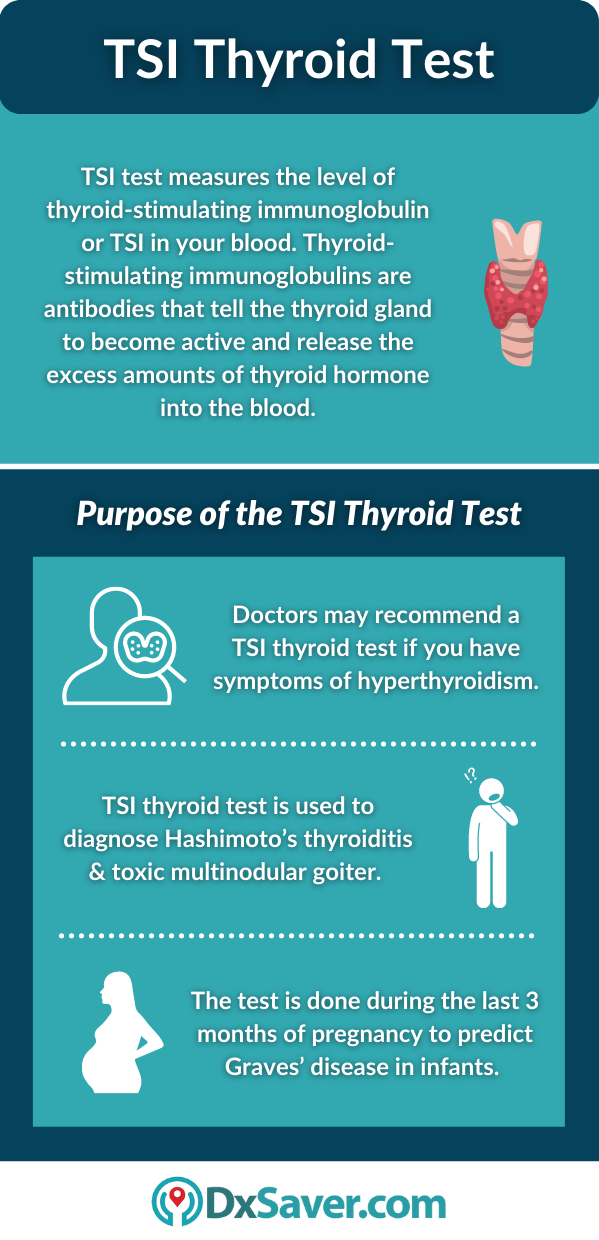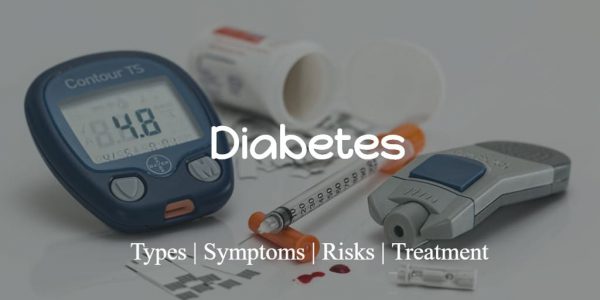
The thyroid is an endocrine gland that is located at the base of the neck. It is responsible for producing various thyroid hormones that help regulate metabolism and other important functions. A thyroid-stimulating immunoglobulin is a form of immunoglobulin G that can bind to thyrotropin receptors on the thyroid gland. Thyroid-stimulating immunoglobulin imitates thyroid-stimulating hormone, which is the hormone that signals the thyroid to produce more T3 and T4.
TSI or thyroid-stimulating immunoglobulin can trigger your thyroid to produce more thyroid hormones than necessary. The presence of these TSI antibodies is an indicator of Graves’ disease. When a person has Graves’ disease, they are more likely to develop other autoimmune diseases like type 1 diabetes or Addison’s disease. Women are more likely to develop Graves’ disease than men.
This article covers all the significant topics related to the TSI thyroid test such as the test cost, purpose and preparation of the test, risk factors, and how to get tested for a TSI thyroid test.
- What is a TSI test?
- Purpose of TSI thyroid test
- How should you prepare for the TSI thyroid test?
- What happens during the TSI thyroid test?
- Risk of this test
- What do your TSI test results mean?
- Provider locations
For our readers who are interested in knowing the TSI thyroid test cost beforehand, we begin with that section.
How much does the TSI thyroid test cost?
TSI thyroid test costs $119 in the US. Prior appointment isn’t required. You can order tests online by comparing the price or visiting the nearest lab during lab business hours. You will get the results in your email in 2 to 3 business days after completing the procedure. Apart from this, doctor consultation is available for any kind of further treatment or medical advice.
The table below shows the TSI thyroid test provider and its price. You can know more and book the test by clicking on the “Book Now” button.
Name of our Partner Labs | Book Online at Offer Price |
HealthLabs
| $119 |
TSI thyroid test cost with insurance
Many insurance companies in the U.S. cover all the vital tests like the TSI thyroid test. However, the coverage provided by private health insurance companies and national health insurance programs like Medicare varies widely. Most of the health insurance policies cover TSI thyroid test costs only once or twice a year and when your physician orders more than twice in a year, you should pay the test cost out of pocket. So, you are recommended to check if your health insurance policy covers the TSI thyroid test cost.
Our TSI thyroid testing providers do not accept any kind of health insurance policy. However, they can provide you with an itemized receipt containing all the details viz the name of the test, code of the test, and CPT code which is necessary for insurance reimbursement purposes.
What is a TSI test?
A thyroid-stimulating immunoglobulin is a form of immunoglobulin G that can bind to thyrotropin (TSH) receptors on the thyroid gland. It imitates the action of TSH and causes excess secretion of thyroxine and triiodothyronine. TSI test measures the level of thyroid-stimulating immunoglobulin or TSI in your blood. When the TSI levels are high in blood it can indicate the presence of Graves’ disease, an autoimmune disorder that affects the thyroid gland. Doctors may also order a TSI test when you have symptoms of hyperthyroidism or if you are pregnant and have a history of thyroid problems.
Purpose of TSI thyroid test
Your doctor may recommend a TSI thyroid test when you have symptoms of an overactive thyroid or hyperthyroidism and if they suspect that you might have Graves’ disease. And this disease is the common cause of hyperthyroidism. TSI thyroid test is also used to diagnose Hashimoto’s thyroiditis and toxic multinodular goiter. Hashimoto’s thyroiditis is swelling and inflammation of the thyroid gland. In the case of toxic multinodular goiter, the thyroid gland is enlarged and has many small, round growths that produce too much thyroid hormone.
TSI thyroid test may also be used to:
- Determine if people with mild hypothyroidism are likely to get worse over time
- Determine the best course of treatment
- Evaluate the risk of relapse after treatment for Graves’ disease
- Monitor patients who were previously treated for thyroid cancer
Additionally, this test is also done during the last three months of pregnancy to predict Graves’ disease in the infant. Graves’ hyperthyroidism affects two out of 1000 pregnancies.

How should you prepare for the TSI thyroid test?
Generally, you don’t need to take any special measures to prepare for the TSI thyroid test. But when your doctor asks you to do so, follow their instructions. Because they may also draw blood for other tests that require fasting at the same time as the TSI test.
What happens during the TSI thyroid test?
This test requires a blood sample. Your nurse or health care professional uses a needle to take a blood sample, usually from the arm. They will tie a band around the upper part of your arm to make your vein fill with blood & swell up. And your health care professional will clean the area with an antiseptic to help prevent infection. After inserting the needle, the blood will be collected into a vial or test tube. You may feel a quick sting or pinch when the needle goes in/out. After taking the sample they will remove the needle & band. And your health care professional will put a piece of gauze over the spot to stop the bleeding. Normally, this blood test takes only a few minutes.
Risk of this test
There is little risk in having a TSI thyroid test. It is common to have minor pain, slight bleeding, or bruising in the area where the needle was inserted. But, the symptoms go away quickly.
What do your TSI test results mean?
The normal value may slightly vary among different laboratories. Some labs may test different specimens or use different measurements. So, talk to your doctor about the meaning of your specific test results. The results of the TSI test are in the form of a percentage or TSI index. Generally, a TSI index of less than 130% is normal. It is important to note that you may also have an autoimmune disorder despite having a normal test result. So, when your doctor suspects that the antibodies might develop over time, then repeat testing at a later date may be necessary.
A higher-than-normal level of TSI may indicate:
- Graves’ disease – This is an immune system disorder that results in hyperthyroidism (overproduction of thyroid hormones). And it is the common cause of hyperthyroidism. Graves’ disease is common among women and in people younger than age 40.
- Hashitoxicosis – It is increased thyroid activity due to inflammation related to Hashimoto’s thyroiditis.
- Neonatal thyrotoxicosis – Your baby has high levels of thyroid hormones at birth because of your high levels of thyroid hormones.
Provider locations
A TSI thyroid test can be done in any of the following locations by visiting the lab near you. To know the TSI thyroid test cost, refer to the first section of the article.
- Alabama
- Alaska
- Arizona
- Arkansas
- California
- Colorado
- Connecticut
- Delaware
- Florida
- Hawaii
- Georgia
- Idaho
- Illinois
- Indiana
- Iowa
- Kansas
- Kentucky
- Louisiana
- Maine
- Michigan
- Minnesota
- Mississippi
- Missouri
- Montana
- Nebraska
- Nevada
- New Hampshire
- New Mexico
- North Carolina
- North Dakota
- Oklahoma
- Oregon
- Pennsylvania
- Puerto Rico
- South Carolina
- South Dakota
- Tennessee
- Texas
- Utah
- Vermont
- Virginia
- Washington
- West Virginia
- Wisconsin
- Wyoming
Frequently Asked Questions
Will insurance cover my testing cost?
No, insurance will not be covered in the billing. However, they will provide you with a receipt for insurance reimbursement purposes.
How should I book my appointment?
You can choose the most suitable provider from above and make an appointment by following the instructions mentioned by them.
Can I cancel my lab test order?
Yes, you can cancel your lab test order any time before your testing. A refund will be initiated after deducting the cancellation fee. However, cancellation is at the discretion of the provider.
Do the providers offer result interpretations?
Yes, a few providers may provide doctor consultation who will take you through the results and provide clarification if needed.
How do I receive my report?
To ensure your privacy, the test report will be mailed to you by the provider.
Other topics you may also be interested in:-
- Arsenic Blood Test – Causes, Symptoms & Treatment of Arsenic poisoning
- What is CoQ10?
- What is the Mineral Deficiency Test?
- Fibrinogen Test Cost in the U.S.
- What is the Occult Blood Test? – Test Cost, and Procedure
- Importance of Aldosterone to Renin Ratio
- Bioidentical Hormone Test: Benefits, and Test Cost
- What is a Parathyroid Hormone?
- Importance of Microalbumin
- What is Perimenopause in Women?
- Symptoms of Lactose Intolerance
- Causes of Zika Virus and their Symptoms
- What is a Titer Test?
- What is the Myasthenia Gravis Test?
- Glucose Blood Test: Purpose, Procedure and Test Results
- What is MMA Fighter Blood Test?






